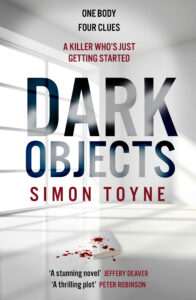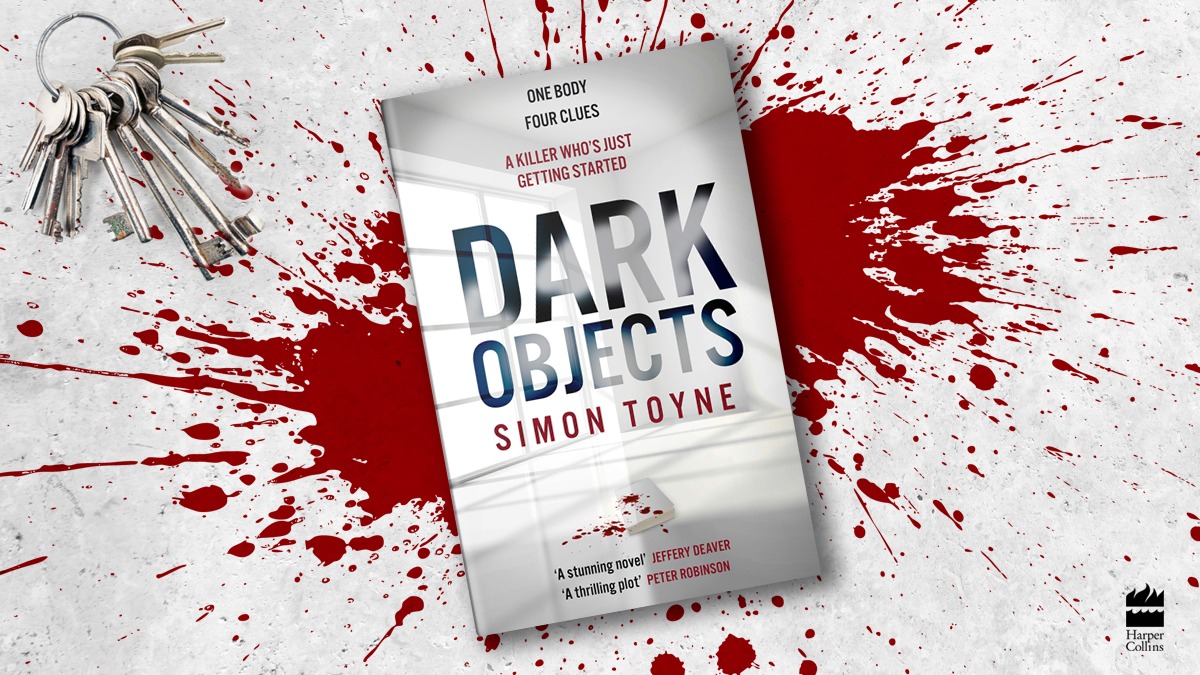
An Impossible Crime Scene
A wealthy woman is found brutally murdered in the locked fortress of her London mansion. Surrounding her are four mysterious objects, including a book on forensics by Dr Laughton Rees.
An Inescapable Past
As a teenager, Laughton’s life was destroyed after witnessing her mother’s brutal murder. Now a mother herself and forensic analyst, she is an expert on how to read crime scenes – but never works live cases.
An Uncatchable Killer
Pressured by the lead detective to help with the investigation, Laughton begins to realise that the objects left by the body are not just about the victim, they’re also about her. Her childhood was destroyed by one killer. Now she must catch another before her daughter’s is destroyed too.
DARK OBJECTS
Simon Toyne
1
Monday morning. Seven thirty.
Celia Barnes unlocks the door to the Miller house for what will be her last time.
She does not know, as she fits the stubby security key into the lock, that in a few short hours it will be bagged and logged along with several other items from the house as pieces of evidence in a murder investigation.
But he knows.
He watches her in his rear-view mirror, watches her turn the key, watches her lean against the heavy door to open it. He is parked down the hill, as close as he can get without parking illegally but far enough away to avoid the steady gaze of the two security cameras fixed high on the front of the house.
The Miller house lies hidden behind a double-height section of brick that blends in with the soot-blackened wall running the length of Swain’s Lane and separating it from Highgate Cemetery beyond. The only indication that anything other than trees, and tombs, and dead Londoners lie on the other side of this higher section of brick is a large square of opaque glass set into the top left corner, and the solid door fitted flush to the wall and painted dark grey to match the sooty brickwork.
Celia Barnes steps through the door now, disappearing into the wall like it’s a trick, and she’s part of a performance, which – in a sense – she is.
He watches the door close behind her, slow and heavy on its automatic closers, like the door to an old-fashioned bank vault where treasures and secrets are kept.
He checks the time then slips a surgical mask over his face. It was not so long ago that anyone wearing a mask in public, especially a medical one, would have drawn attention. Now they were commonplace, a fact that had been extremely useful over the last few months.
He steps out of the car, fastening his coat against the morning damp as he heads away from the Miller house and down the hill towards one of the gates leading into the cemetery. Official opening hours are ten to four, but he picked the lock earlier and will lock it again when he leaves – the gate that leads to the cemetery, the cemetery that leads to the back of the Miller house.
His heart beats faster as he walks, but he forces himself to go slowly, to take his time. Afterwards, when blue-and-white police tape ribbons the house, questions will be asked and someone might remember a man in a hurry. And he has plenty of time. He knows Celia’s routine, knows which rooms she will clean first and how long she will spend in each. At this moment he knows as much about Celia Barnes as she does herself, more even, because he can also see her future – he knows what will happen to her next, though this knowledge brings him no pleasure.
Celia Barnes is an innocent in all of this and yet what she is about to experience will be horrifying and cruel. But it is also necessary.
Inside the Miller house a soft beeping sound echoes across the dark, polished wood that lines the empty hallway and up the steel and teak staircase that rises through the centre of the building like the spine of the house.
Celia Barnes glances up at the security camera pointing down at the door, waits a second for the face-recognition software to verify who she is, then opens a small teak hatch set into the concrete wall by the door. A keypad lights up inside next to a square sensor and she squints at the sequence she wrote on her hand. The code is long and complex, a mixture of symbols, numbers and letters that gets changed regularly and texted to her by Mike, the owner of the house. She only has thirty seconds before the alarm goes off so writes the code on her hand before leaving her flat in big, biro letters so she doesn’t have to fumble for her phone or her glasses and waste precious time. On her second day cleaning for the Millers she had got the code wrong, or possibly taken too long, or maybe both and had set the damn thing off. The noise was unbelievable, an ear-splitting siren shriek that ripped through the house and brought the police hammering on the door in under two minutes. Two minutes!
When her own flat had been burgled just before Christmas it had taken more than two hours for anyone to show up, and even then it had only been a PCSO, one of those Police Community Support Officers her Derek called ‘plastic coppers’. But then she lived in a two-bed, ex-council flat in Archway, not some architect-designed Highgate mansion worth three or four million quid or whatever it was.
When she first got the job here Celia had tried to find out. She does it with all the houses she cleans, takes a guess at how much the house is worth then pops the address into Rightmove to check the sold prices on the street. She’s actually got pretty good at it, so much so that her Derek says she should jack in the cleaning and go work for one of those upmarket estate agents doing valuations and driving around in one of those fancy little electric BMW jobs. Celia loves that he thinks she could do a job like that, loves what it reveals about the way he sees her, but she knows she could never do it. They’d never hire her for a job like that, she’s not enough – not young enough, confident enough, or posh enough. She’s also only good at guessing the prices of houses that are similar to others, she never has a clue how much the quirky one-offs are worth, the modern mansions that look more like offices than homes. There is no record of how much the Miller house sold for, for example, not on Rightmove, or Zoopla, or any of the property sites she regularly uses. There is no other house like the Miller house on this street, or in the whole of Highgate come to that, so she has no idea how much it’s worth other than ‘a lot’, and that’s not going to get her a job in a swanky estate agent now, is it?
Celia’s hand trembles slightly as she taps in the last few digits of the code, her anxiety levels closer to those of someone deactivating a bomb than switching off a house alarm. This is another reason she could never work for a posh estate agent, all those different alarms to deal with, all the different codes, all the people, all the stress. Give her a good audiobook, an empty house, a hoover and a bucket of bleach any day of the week; she’s perfectly happy with her little lot. Her Derek’s got his bit of disability pension from the railways, they paid their mortgage off on the flat last year, and her cleaning brings in enough each week to keep them nice and comfy. She’s more than happy.
She enters the code then presses her thumb to the square sensor. The beeping falls mercifully silent.
Celia Barnes lets out a long breath she didn’t know she’d been holding and shrugs off her coat as she makes her way across the white resin floor to the twisted staircase, listening out for any signs of life. Just because the alarm was on doesn’t mean there’s no one at home; she’d found this out the hard way once when she’d burst in on Mike one morning, working out in the mini-gym off the master bedroom. He’d had his earphones in so hadn’t heard her, and was wearing gym shorts and nothing else and, my, but what a sight that had been. Celia had stood there, frozen to the spot, mesmerized by the way his muscles moved beneath his smooth, tanned skin as he lifted the weights and studied himself in the floor-to-ceiling mirror. He’d looked like one of those men in the celebrity magazines she flicked through at the hairdressers, those cartoonish men with perfect, tanned skin and knots of muscles in their stomachs that looked like they’d been painted on. Except Mike Miller was real, there he’d been, right in front of her, in the flesh.
She had traced the outline of him with her eyes, up his legs, over the firm curve of his bum and his back. That was when she’d realized he’d stopped lifting the weights and was now looking right back at her in the mirror. She’d blushed and felt flustered and faint, but Mike had just smiled and then he had apologized to her, and wasn’t that just like Mike? So laid-back, so confident that even an awkward moment like that could be smiled away as if it was nothing at all.
It was unfair really how some people seemed to have everything – money, health, beauty, charm. Kate Miller was the same. The Millers were a different breed, a golden couple, like an evolutionary step up had given them all the gifts and lifted them above the level of ordinary folk. It would have been the easiest thing in the world to hate them – if only they hadn’t been so nice.
Celia reaches the stairwell and pauses, looking through the wall of glass across the overgrown cemetery to the distant marvel of London. A few of the other houses she cleans have views over the city too, but nothing like this. Because the Miller house backs on to the cemetery there are no other buildings to block the view and even the security fence has been specially designed so that what you can see when you look out through the floor-to-ceiling windows are the trees, their green leaves fading now to autumn amber, and London shimmering in the far distance.
He watches her from the shadow of a sycamore tree.
He is standing a few metres off the main pathway and tucked out of sight behind the tomb of some long-forgotten Victorian milliner. Celia Barnes does not look his way. She does not look down at the cemetery at all. She looks at the distant view, like she always does.
Almost the entire back wall of the Miller house is glass, three floors of perfectly aligned, highly polished panels that mirror the sky and make the house appear almost invisible. Celia Barnes is framed in the dead centre of it, a tiny, semi-transparent figure, floating among grey, reflected clouds. He watches her in her stillness, a moment of calm before the coming storm, then she turns and heads downstairs to the utility room where the cleaning equipment is kept.
She walks slowly, placing each foot deliberately and softly on the hardwood steps as she descends, keeping her footfalls soft so as not to wake anyone who may still be sleeping somewhere in the vast house. It is thoughtful of her, but there is no need. She could make as much noise as she likes and no one would hear, not in the house, and not out here in the cemetery. The wall of sky-reflecting glass – triple-glazed and imported from Norway where it was designed to keep out the worst of the Norwegian winter – also blocks out sound. The people inside the house are insulated from the constant hum of the city. No sound gets in. And no sound gets out either.
He watches until she slips from sight then moves forward, keeping to the shadows as he moves through rows of crooked tombstones and laurel bushes, heading closer to the cleverly designed security fence and the house that lies beyond.
Celia hangs her coat on the hook behind the utility room door, takes a mop bucket from beneath the stainless-steel sink and starts filling it. She fits her earbuds into place and restarts the audiobook on her phone, the latest Donna Leon. She may spend the next few hours cleaning someone else’s toilets and floors in a house in Highgate but in her head she will be in Venice with Commissario Brunetti, zipping around the canals on a Vaporetto, eating deliciously described Venetian food and grumbling about the tourists as he tracks down another devious killer.
She tips bleach into the bucket and watches the water rise and froth until it is half full, then turns off the tap and heads into the house.
The first room she cleans is the downstairs toilet because it hardly gets used and is an easy one to tick off her list. It is also furthest from the master bedroom so any noise she makes here is less likely to disturb the Millers – if they’re in. Celia opens the garage door as she passes by to check. Neon lights flicker on revealing that both Kate and Mike’s cars are there, so she closes the door softly and continues to the downstairs toilet, closing the door behind her before starting to clean. If Kate and Mike are sleeping let them sleep a little longer.
It takes Celia less than five minutes to wipe down the already spotless marble surfaces and sweep and mop the floor, an American-accented voice describing Brunetti inspect-ing a body in the Campo Santo Stefano as she works. Then she refills her bucket in the utility room and heads upstairs to the ground floor, pausing her audiobook at the top of the stairs to listen again for any sign that the Millers are stirring. She hears nothing, restarts her audiobook and returns to Venice in her head as she steps into the main living room.
The Millers’ living room, like the rest of the house, is white: white walls, white floors, white furniture, the only visible colour the orangey green of the autumn graveyard seen through the wall of glass on her left.
But now there is another colour.
Now there is also red, vivid stripes of red that slash across the walls and ceiling, across the white leather sofa and the large photograph of Kate and Mike Miller that hangs above the white marble fireplace. In the picture they are wearing matching white shirts, hugging and smiling, their teeth as white and perfect as the house. Only Kate’s smile is now broken by something black, and green, and ugly sticking into the centre of her face.
Celia takes a step forward, trying to process what she’s seeing. It looks like a pot of red nail polish has been thrown around the room and she automatically starts thinking about how she might clean it up and get the stains out. Then she takes another step, sees something on the floor, something hidden by the sofa when she first came in, and realizes what the red is.
He watches the bucket fall from Celia’s hands, the distance and thickness of the glass rendering the action silent. Her hands fly to her mouth and she staggers backwards, eyes wide and fixed on the floor.
From where he is standing he cannot see what Celia is looking at, but he can see the horror of it reflected in her face and it saddens him. Her anguish was not his desire but it was unavoidable and he had to be here to make sure her strong and natural instinct to clean would not compel her to disturb the careful scene he has left behind.
Up in the Miller house Celia Barnes continues to stagger away from the horror in the centre of the room until her back hits the wall and she dislodges another photograph showing the whiter-than-white Millers, smiling in their happy perfection. The jolt seems to break Celia from her trance and her hands fall from her mouth and she fumbles her phone from her pocket, breaking her gaze for a moment to stab a number into it before resuming her wide-eyed stare at the floor as she lifts the phone to her ear.
He takes a small handheld radio from his pocket, his eyes flicking away from Celia Barnes just long enough to activate it before looking back at her. She continues to stare down, eyes wide, hand visibly shaking as it holds the phone to her ear. She starts to talk, her free hand fluttering as she speaks, gesturing at the floor as if the person on the other end of the line can see what she is describing. After a few moments she stops talking and starts nodding instead.
His Tetra radio cannot intercept mobile phone signals but it can pick up the radio traffic of the emergency services that should follow. The police dispatcher on the other end of the line will be calming her now, reassuring her, telling her to hold on for a moment while they call for assistance. He listens to the whisper of the wind through the branches above his head then a soft digital squawk pops in his ear.
‘Urgent assistant required,’ a female voice says. ‘Report of a serious knife assault at . . . number three Swain’s Lane, NW8.’
There is a pause then a different voice answers, a police squad car, acknowledging the call and confirming it is inbound.
Up in the Miller house Celia Barnes continues to nod and stare at the floor. The dispatcher will now be telling her that officers are coming, that she should stay where she is and – most important of all – that she should not touch anything.
He watches for a few moments more, making sure that Celia Barnes does what she is told and does not move closer to the body or disturb any of the things he has so carefully left to be found.
Somewhere in the distance the dim wail of a siren starts up, rising and falling, and getting louder. He waits until there is no doubt where it’s heading then walks slowly backwards, his eyes locked on Celia Barnes for as long as he can still see her, framed in the centre of the wall of glass, floating in the reflected sky like a ghost above the graveyard.
Want to keep reading?




